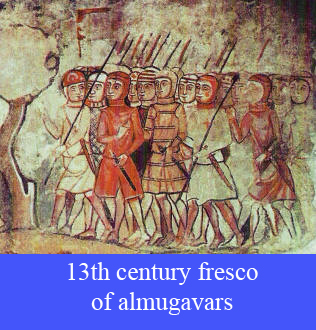Despite the successes of Roger
of Lauria and Prince James
against the Angevins, Peter III had to deal
with his own set of problems in Aragon and Valencia. While the effort to
control Sicily and its trade routes had been generally popular in
Catalonia, the expenditure of
 money and the king's preoccupation with
Sicily had led to political unrest at home. In order to fund the
expedition to North Africa and Sicily, the king had to resort to a variety
of taxes to raise the necessary funds. Peter's use of Roman law as means
of increasing his authority and his attempts to extend the Catalan tax
called the bovatge into Aragon and Valencia had also fed the
unrest.The nobility had seen
little value in the war since there was no chance for them to increase
their holdings and saw Peter III's entanglement as an opportunity to
further their interests at the Crown's expense.
The nobles had complained of these abuses to the king at a
parliament at Tarazona in 1283, but Peter had chosen to ignore them. The
nobility and citizens responded by forming the Union of Aragon and calling
a general cortes in Zaragoza in October where they made a series of
demands, called the Privilegio General.
The cortes demanded a limit to the taxes the king could
impose, removal of Catalan and foreign administrators, a return to the fueros
of the land, and that the king call an annual general cortes to
consult with the people. Valencia, seeing an opportunity to expand its
freedoms also formed a Union and demanded the same privileges from Peter.
money and the king's preoccupation with
Sicily had led to political unrest at home. In order to fund the
expedition to North Africa and Sicily, the king had to resort to a variety
of taxes to raise the necessary funds. Peter's use of Roman law as means
of increasing his authority and his attempts to extend the Catalan tax
called the bovatge into Aragon and Valencia had also fed the
unrest.The nobility had seen
little value in the war since there was no chance for them to increase
their holdings and saw Peter III's entanglement as an opportunity to
further their interests at the Crown's expense.
The nobles had complained of these abuses to the king at a
parliament at Tarazona in 1283, but Peter had chosen to ignore them. The
nobility and citizens responded by forming the Union of Aragon and calling
a general cortes in Zaragoza in October where they made a series of
demands, called the Privilegio General.
The cortes demanded a limit to the taxes the king could
impose, removal of Catalan and foreign administrators, a return to the fueros
of the land, and that the king call an annual general cortes to
consult with the people. Valencia, seeing an opportunity to expand its
freedoms also formed a Union and demanded the same privileges from Peter.
Peter was in a serious predicament. At another time he might have been able to deal with this political insurrection, but the threat of attack from France and his own excommunication gave the nobles leverage and by the start of 1284 Peter was forced to confirm the privileges of the Unions of Aragon and Valencia. Yet despite these concessions, Peter found that in the spring of 1285 he could count on very little help from either region. Many preferred to wait and see if there might be more to be gained by having the king and the Catalans defeated or at least mauled by the French. Moreover, his brother, King James of Mallorca, had decided to side with the French in an attempt to break from his vassalage to the Crown of Aragon. Thus Peter could only rely on the Catalans, his almugavars, and his fleet to defeat the French invasion.


